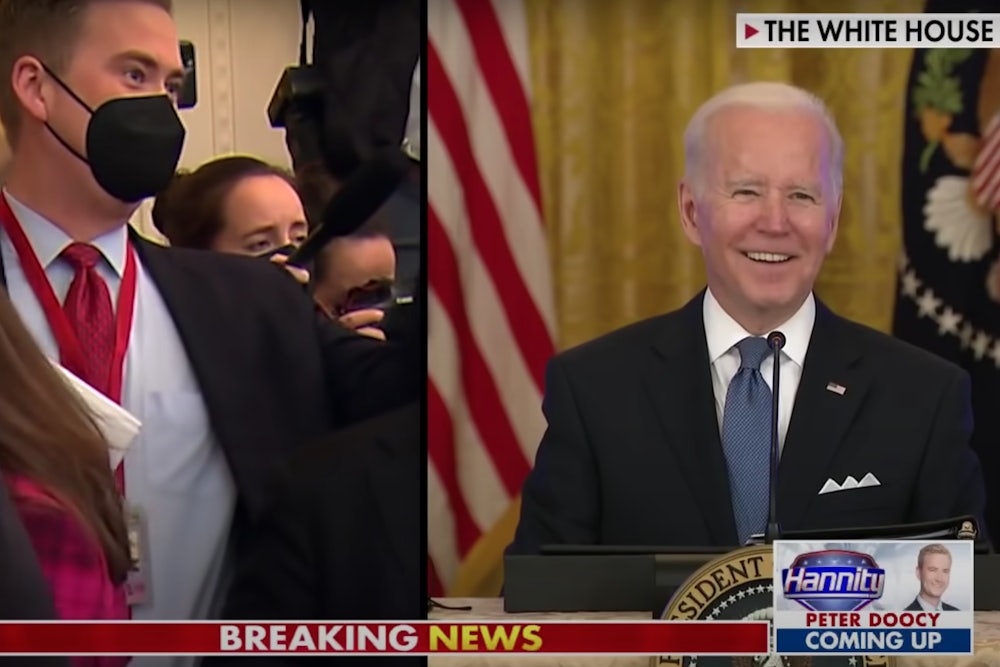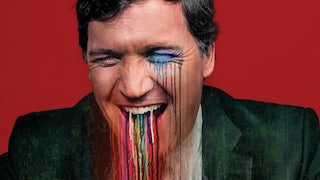We’ve seen much commentary about whether it was inappropriate for Joe Biden to mumble into a hot mic that Fox News’s Peter Doocy was a “stupid son of a bitch,” and not enough about whether Biden’s assessment was truthful.
The first question is easily answered. No, presidents should not go around calling reporters names for asking stupid questions. Biden later phoned, Doocy said, to “clear the air.”
But yes, Doocy’s question—“Do you think inflation is a political liability in the midterms?”—was stupid. Of course inflation is a political liability in the midterms. Doocy knew this, and he knew Biden knew this, and Biden, in his under-his-breath reply, confirmed through sarcasm that he knew this: “It’s a great ask, that. More inflation. What a stupid son of a bitch.” (The White House transcript renders “ask, that” as “asset,” but that doesn’t make any sense. I think Biden said, “ask, that,” or, if he didn’t say “ask that,” that’s what he meant.)
Biden was irritated by Doocy’s question because he knew its sole purpose was to embarrass him. Doocy wanted to get Biden to deny inflation was high, which it is, or that it’s a source of all kinds of worry, including political worry, which it is. Biden was expressing weariness with the game, which, played properly, required him to dodge the question somewhere along the lines of, “I’m not going to speculate about elections that are still 10 months away.”
Doocy is famous for asking loaded questions intended to cause Biden political embarrassment. After all, he works for Fox News. And it’s not the first time somebody’s accosted Doocy for asking a stupid question. In 2017, during a tense moment between Senator John McCain and President Donald Trump, Doocy asked McCain, “Has your relationship with the president frayed to the point that you are not going to support anything that he comes to you and asks for?”
McCain replied, quite properly:
Why would you say something that stupid? Why would you ask something that dumb? Huh? My job as a United States senator, is a senator from Arizona, which I was just reelected to. You mean that I am somehow going to behave in a way that I’m going to block everything because of some personal disagreement? That’s a dumb question.
But let’s don’t make this solely about Doocy. Here is one instance where you can’t accuse Fox of not playing by the rules. It’s the rules themselves that are bad, and they have been for decades. They’ve rewarded political reporters, and especially TV reporters, for turning White House press availabilities and press conferences into opportunities to perform rather than inquire. The introduction into the White House press corps of right-wing crackpots like Chanel Rion of the conspiracy-mongering One America News Network made things worse, but they were pretty bad already.
The problem goes back at least as far as March 1974, when CBS White House correspondent Dan Rather made an insolent comment to President Richard Nixon at a press conference before an audience at a National Association of Broadcasters convention in Houston.
Feelings were high. Nixon was six months away from being forced to resign, Rather’s aggressive Watergate reporting had made him a sort of national hero (he certainly was mine), and Houston was Rather’s hometown. When Rather stood up to ask a question, the broadcasters gave him an ovation. There was also a scattering of boos from Nixon plants in the audience. (Rather would later recall that “they were mostly boos,” but that’s not what the video shows, and anyway, it isn’t particularly relevant.)
After the applause died down, Nixon needled Rather: “Are you running for something?” The audience laughed and applauded. Rather should have let it go. Instead, he fired back, much less playfully: “No sir, Mr. President. Are you?” (Nixon was in his second term and thus probably done with campaigns.) That got a bigger laugh.
The uncomfortable smile on Nixon’s face in response to Rather’s back talk was gratifying to see, and at the time I loved it. But Rather was out of bounds. The audience’s laughter expressed appreciation less for Rather’s wit than for his chutzpah.
Later, Rather regretted that nobody remembered his question, which was about inconsistencies between Nixon’s account of Watergate and the accounts emerging from Watergate special prosecutor Leon Jaworski’s investigation. The question was eclipsed by Rather’s theatrical counterpunch beforehand.
That marks probably the last moment in history when a TV reporter felt even vaguely guilty for playing to the galleries. The next incident I remember took place in October 1988, a little more than a week before Election Day, when Mike Dukakis appeared on ABC’s Nightline. Ted Koppel was the show’s host, and he and Nightline were at the peak of their renown.
Koppel felt that Dukakis did not field his questions satisfactorily, so at the end he told him: “With all due respect, let me suggest to you I still don’t think you get it.”
Watching at home, I was appalled. First of all, who the hell was Koppel to announce to America that Dukakis wasn’t fit to be president? And secondly, “you don’t get it” is a snobbish putdown, a content-free insult that reduces to, “I understand the world, and you don’t.” In that context, the words “with all due respect” sounded like a taunt.
Was Koppel ashamed? Perhaps he might have been had Dukakis pulled off an upset victory. But when Koppel ended his 25-year gig hosting Nightline, he actually noted it as one of the highlights of his career:
He was way behind in the polls. And this was an opportunity to, if not turn things around entirely, at least close the gap. It ended up being a total disaster for the Dukakis campaign.… I was saying to him, “Governor, you know, here’s a chance to get a network audience for one hour in which you are being asked questions,” and he kept saying the same things he had been saying in the campaign throughout. I didn’t mean it to be rude, but it came out that way. And he missed that opportunity, too.
What’s notable here is that Koppel’s proud memory included not a scrap of whatever it was Dukakis said in that interview. The achievement was solely what Koppel himself said.
I don’t recall Koppel’s put-down of Dukakis generating anything like the commentary Rather’s insolence to Nixon occasioned 14 years earlier. But at least Koppel admitted it was rude.
Reporters have long since stopped apologizing for lecturing to politicians. The reporter’s question became the sole item of interest; the answer, usually evasive when it wasn’t an outright lie, was incidental. This wasn’t true 100 percent of the time, but it was true much of the time.
It probably didn’t help when the White House daily press briefing started being televised during the Clinton administration. “It’s performance art and theater of the absurd,” Clinton spokesperson Mike McCurry concluded. When Trump shut down daily White House press briefings in 2018, I couldn’t bring myself to mourn. They were always an especially big waste of time because Trump’s press secretaries were unprecedentedly bold in their prevarications.
Here are some of the questions Biden fielded at his last formal press conference, on January 19. One of them came from a Newsmax hack (I’ll let you guess which one), but most of them came from real reporters:
“Did you overpromise to the American public what you could achieve in your first year in office?”
“Is this country more unified than it was when you first took office?”
“I’m not sure I’ve heard you say if you would do anything differently in the second year of your term. Do you plan to do anything differently?”
“Why do you suppose such large segments of the American electorate have come to harbor such profound concerns about your cognitive fitness?”
Here’s my question: Do you, dear reader, remember how Biden answered any of these questions? Are you even vaguely curious to find out?
The reporters attending such press conferences are not stupid. You don’t get assigned to the White House beat if you’re less than excellent at your job. Not from a major news organization, anyway. Stupidity may be the problem, but most of the people asking stupid questions aren’t stupid.
So why does it happen? One reason is the vague wish that an annoying question will provoke a memorably peevish answer that will be news for a day before everybody forgets it. Thus Doocy’s victory lap for getting Biden to call him a stupid son of a bitch. (If you think Doocy’s anything but delighted, you don’t understand the press.)
Another reason is that if you have a really good question that will help you publish a scoop, the last thing you want to do is blab it someplace where all your competitors will hear. The better White House reporters (The New York Times’ Maggie Haberman, for instance, during the Trump years) tend not to spend a lot of time preening for the TV cameras.
Yet another reason is that Washington bureau chiefs and other representatives of upper management often strategize with White House reporters about what to ask, and woe betide the White House reporter who blows off the bosses’ suggestions just because too many cooks spoiled the broth.
A final reason is that White House reporters crave lucrative contracts to provide regular commentary for cable networks, and to snag those you have to demonstrate that you’re good on TV.
As a general rule, the best White House stories nearly always get broken outside the White House. Bob Woodward and Carl Bernstein were metro reporters in Washington when they cracked Watergate. The Iran-Contra story trickled out in bits reported outside the country by AP’s Robert Parry and others. Trump’s Ukraine meddling, which led to his impeachment, first broke in an unsigned Washington Post editorial by Jackson Diehl.
What distinguishes these efforts was that they resulted not from asking questions but from listening very carefully to the answers.
Oh—and obviously, the Newsmax reporter’s question was the one about Biden’s cognitive fitness. Biden replied that his cognition is in terrible shape. Just kidding!








